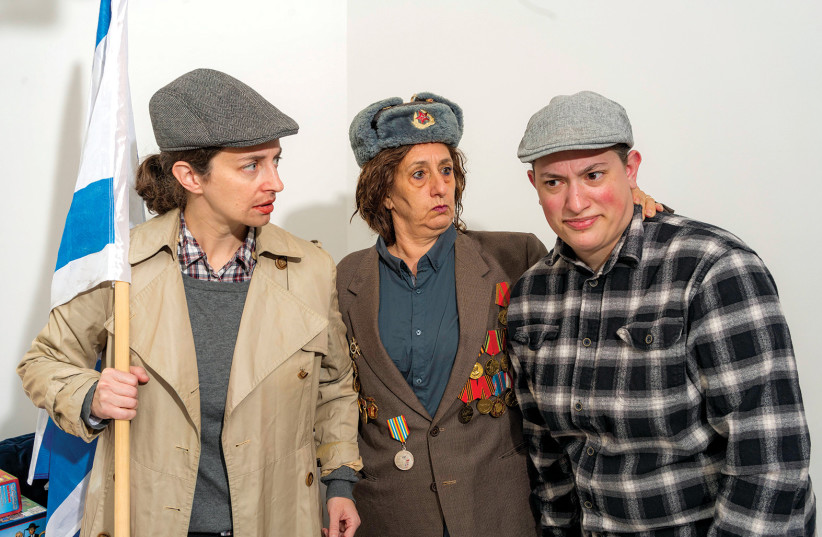When they first told others about their play, Whisper Freedom, which premieres March 6 at Jerusalem’s Israel Arts and Sciences Academy (IASA) theater, coauthors Sharon Katz and Avital Macales were met with blank stares. Set in Moscow of the 1970s, the play explores the decades-long struggle to free Soviet Jews from communist oppression.
“We realized that many people don’t know the story of one of the most important struggles in Jewish history. Even children of Russian olim who came to Israel, thanks to the self-sacrifice of the refuseniks and their supporters, didn’t know the story!” Katz wrote in an email.
To Katz, an immigrant from Long Island who spent her teenage years protesting on behalf of Soviet Jewry, this made the play feel even more urgent. Recent events have only compounded that sense.
“Look at what’s happening now in Ukraine,” Katz pointed out. “[Russia] is trying to take control of Ukraine and deny [its citizens] freedom, just as it tried to crush any Soviet Jews who wanted to discover their identity and be free.”
Set in 1972 Moscow, Whisper Freedom tells the story of Elena Ivanova, a Moscow stage star who painstakingly conceals her Jewish identity. Her character is played by composer and musician Hadassa Daniels. When her refusenik sister Sofia (Jerusalem Women’s Performance Community veteran Michal Lourenco) suddenly turns up in Moscow to plead for her freedom before visiting US president Richard Nixon, Elena is unwittingly drawn into her sister’s refusenik orbit.

In a memorable scene, Sofia turns her sister’s apartment into an underground ulpan, infuriating Elena who is still an ardent communist.
It is only after her arrest on trumped-up charges and imprisonment in Siberia that Elena becomes disillusioned. Eventually, Sofia secures permission to immigrate to Israel, where she devotes herself to fighting for her sister’s freedom. One scene – depicted through the use of a split stage – demonstrates the authors’ creative talents. On one side, the audience sees Elena in her Siberian exile. On the other side, Sofia rallies the entire cast and the audience on behalf of her sister.
DETERMINED TO tell the story accurately, Macales and Katz spent close to three years working on Whisper Freedom, traveling to Moscow and then reading books and articles, watching documentaries, and interviewing any former refuseniks who agreed to talk to them.
The writers had envisioned a November 2020 debut, but the pandemic threw a monkey wrench into their plan. “God granted us another year to perfect the script and deepen it,” said Macales, a native of Los Angeles who made aliyah with her family as a young child.
They took advantage of the lockdowns to expand their research. Among their interviewees was former Knesset speaker MK Yuli Edelstein, who reminisced about his experiences teaching in a clandestine ulpan. That inspired a change in the staging. “When he told us that he taught some of his lessons using dialogues on a record player, we put that into the show,” said Katz.
With the pandemic still raging, the team wondered how they would mount the play, but the determination of their subjects inspired them to persist.
“We made up our minds, with God’s help we were going forward,” said Katz.
WITH PUBLIC spaces shuttered, how would they assemble a cast and rehearse? Although the building was closed to the public, Katz and Macales secured permission to hold rehearsals in the OU Israel Center, their home base for the past six years.
Following Health Ministry regulations, cast members presented their Green Passes upon entry and despite the discomfort, they kept their masks on throughout the rehearsals. Auditions were held in September and a month later the play went into rehearsals.
When the Omicron variant hit, rehearsal attendance dipped as cast members got sick or were in quarantine with infected family members. The producers found a solution in technology. Along with cast members, laptop computers now lined the stage. “We would Zoom people into rehearsals on a speaker from home,” recalled Macales.
One notable night, 20 women out of a cast of 54 participated via Zoom. Among the remote participants were the play’s star, the director and the musical director. As helpful as it was, Zoom had its glitches. The actors could perform successfully but the singers could not.
“If two or three people sing together, they don’t hear each other at the same time and that tiny lag is enough to ruin a song,” Macales explained. To preserve momentum, Macales sang those parts herself.
“One night she sang 20 different parts,” Katz recalled.
Whisper Freedom is the third historical musical Macales and Katz have written together. Like their other plays, Whisper Freedom is a production of the Jerusalem Women’s Performance Community, a performing arts initiative, which they created in 2016 along with partners Shifra Penkower and Bati Katz-Koplon. The group provides a forum for female performers who want to express themselves in an all-female environment.
Members hail from all sectors of Jerusalem. “We have haredi women and secular women and everything in between,” said Macales. Through their shared love of the performing arts, these women become not only friends but surrogate sisters.
The performers’ skill level also varies. Along with amateurs, the cast boasts a professional ballerina, as well as performers with years of training in music and theater.
The play is a passion project but a demanding one. The cast had agreed to a five-month commitment to participate in two three-hour rehearsals a week, which grew longer as opening night drew nearer.
But it’s a labor of love as well as a charity project. Proceeds will fund an OU Israel Center initiative for at-risk teens. ❖
Play dates: March 6, 10, 13.
For more information: wpcjerusalem.wixsite.com/wpcjerusalem/whisperfreedom
The audience is women/girls only.
